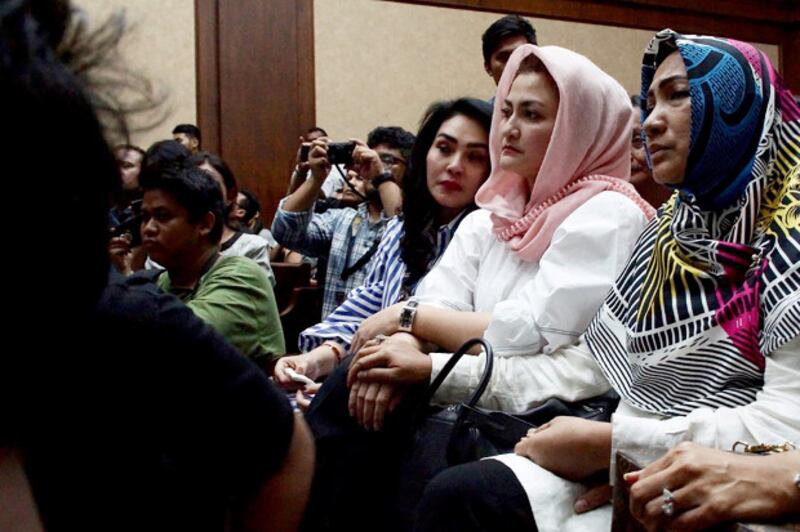Former Indonesian House Speaker Setya Novanto flashed a smile Thursday while shaking hands with prosecutors who want him to spend 16 years in prison and pay a 1 billion rupiah fine for his alleged role in one of the country’s largest graft scandals.
The prosecutors asked the court in Jakarta for the prison sentence and the fine totaling U.S. $72,679 and demanded he repay $7.4 million (101 billion rupiah) that he is accused of having embezzled from a 2009 government project to produce national biometric identity cards (e-ID cards).
“He tried to comply with the process, even though as a normal person, he was a bit shocked,” lawyer Firman Wijaya, said of his client’s response to the prosecution’s demands.
Setya’s demeanor was far different from his court appearance at the start of his trial in December 2017, when he said he suffered from diarrhea and claimed to be unable to listen to the judges.
During Thursday’s 4½-hour hearing, prosecutors demanded that the judges reject Setya’s request to serve as a justice collaborator.
Prosecutor Abdul Basir, who read out the demands, said Setya would not qualify even though he disclosed that two politicians from the ruling Indonesia Democratic Party of Struggle (PDIP) – Puan Maharani and Pramono Anung – also allegedly accepted money from the e-ID card project.
Both politicians, who serve as senior ministers in President Joko “Jokowi” Widodo’s cabinet, denied Setya’s allegations that they each received $500,000 (6.87 billion rupiah).
“The law stipulates that a justice collaborator has to meet several requirements, namely providing significant testimony and disclosing names of more prominent people involved the case,” Basir said. “Based on those parameters, the defendant doesn’t qualify as a justice collaborator.”
Firman said he was disappointed the court upheld the prosecution’s demand.
“Throughout the demand hearing, we didn’t hear any significant reason why the request to be a justice collaborator should be denied,” he said.
The lawyer added he would continue to request that Setya be granted the status when he presented a plea to the court during the next session on April 13. It will state his client is willing to disclose more about the case.
“We will prepare the plea. Setya and the legal team will read it out,” he said.

Case against Setya
Prosecutors said evidence showed that Setya had violated the country’s anti-graft law by intervening in the e-ID project through a series of meetings. They alleged that he met with two officials from the Home Affairs Ministry, Irman and Sugiharto (who both go by one name), and an entrepreneur, Andi Narogong, who were sentenced last year for their roles in the scheme.
“The defendant even reminded Irman to deny any connection with him if the KPK questioned him,” the prosecutor said.
Irman and Sugiharto were sentenced in July 2017 to seven and five years in prison, respectively, and Andi was sentenced to eight years in December 2017 for their involvement in the graft case.
“Based on the aforementioned facts, the defendant is guilty of having violated his authority as a legislator, whose role was to oversee the project, into committing crimes,” the prosecutor added.
A politician from the Hanura Party, Miryam Haryani, was sentenced to five years for committing perjury in the case.
Setya has twice been forced to resign as speaker of Indonesia’s House of Representatives (DPR) over corruption-related allegations, including over the electronic ID scandal.
In December 2015, he stepped down as speaker after the head of Freeport McMoran in Indonesia, Maroef Sjamsoeddin, told a parliamentary ethics panel that he had secretly recorded a meeting during which Setya had allegedly asked for a 20 percent-stake in the mining company.
Setya denied the allegation. Indonesia’s attorney general later dropped an investigation and the Constitutional Court ruled in his favor. He was reappointed as House speaker last year.
